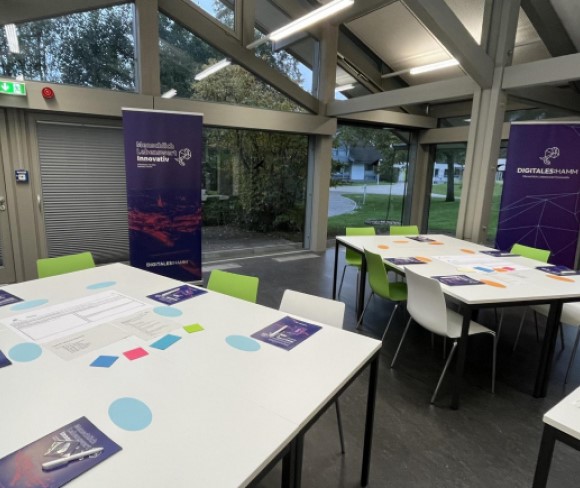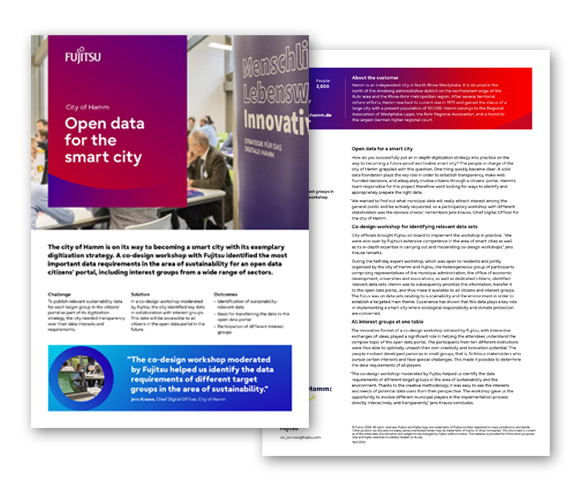The city of Hamm is on its way to becoming a smart city with its exemplary digitization strategy. A co-design workshop with Fujitsu identified the most important data requirements in the area of sustainability for an open data citizens’ portal, including interest groups from a wide range of sectors.
Challenge
To publish relevant sustainability data for each target group in the citizens’ portal as part of its digitization strategy, the city needed transparency over their data interests and requirements.
Solution
In a co-design workshop moderated by Fujitsu, the city identified key data in collaboration with interest groups. This data will be accessible to all citizens in the open data portal in the future.
Outcomes
- Identification of sustainability relevant data
- Basis for transferring the data to the open data portal
- Participation of different interest groups
The co-design workshop moderated by Fujitsu helped us identify the data requirements of different target groups in the area of sustainability.
Jens Krause, Chief Digital Officer, City of Hamm

10
different interest groups in the co-design workshop
- Industry: Public
- Location: Germany
- People: 2,800
- Customer's website

About the customer
Hamm is an independent city in North Rhine Westphalia. It is situated in the north of the Arnsberg administrative district on the northeastern edge of the Ruhr area and the Rhine-Ruhr metropolitan region. After several territorial reform efforts, Hamm reached its current size in 1975 and gained the status of a large city with a present population of 181,000. Hamm belongs to the Regional Association of Westphalia-Lippe, the Ruhr Regional Association, and is home to the largest German higher regional court.
Open data for a smart city
How do you successfully put an in-depth digitization strategy into practice on the way to becoming a future-proof and livable smart city? The people in charge of the city of Hamm grappled with this question. One thing quickly became clear: A solid data foundation plays the key role in order to establish transparency, make well founded decisions, and adequately involve citizens through a citizens‘ portal. Hamm‘s team responsible for this project therefore went looking for ways to identify and appropriately prepare the right data.
“We wanted to find out what municipal data will really attract interest among the general public and be actively requested, so a participatory workshop with different stakeholders was the obvious choice,” remembers Jens Krause, Chief Digital Officer for the city of Hamm.
Co-design-workshop for identifying relevant data sets
City officials brought Fujitsu on board to implement the workshop in practice. “We were won over by Fujitsu‘s extensive competence in the area of smart cities as well as its in-depth expertise in carrying out and moderating co-design workshops,” Jens Krause remarks.
During the half-day expert workshop, which was open to residents and jointly organized by the city of Hamm and Fujitsu, the heterogeneous group of participants comprising representatives of the municipal administration, the office of economic development, universities and associations, as well as dedicated citizens, identified relevant data sets. Hamm was to subsequently prioritize this information, transfer it to the open data portal, and thus make it available to all citizens and interest groups. The focus was on data sets relating to sustainability and the environment in order to establish a targeted main theme. Experience has shown that this data plays a key role in implementing a smart city where ecological responsibility and climate protection are concerned.
All interest groups at one table
The innovative format of a co-design workshop initiated by Fujitsu, with interactive exchanges of ideas, played a significant role in helping the attendees understand the complex topic of the open data portal. The participants from ten different institutions were thus able to optimally unleash their own creativity and innovation potential. The people involved developed personas in small groups, that is, fictitious stakeholders who pursue certain interests and face special challenges. This made it possible to determine the data requirements of all players.
“The co-design workshop moderated by Fujitsu helped us identify the data requirements of different target groups in the area of sustainability and the environment. Thanks to the creative methodology, it was easy to see the interests and needs of potential data users from their perspective. The workshop gave us the opportunity to involve different municipal players in the implementation process directly, interactively, and transparently,” Jens Krause concludes.








